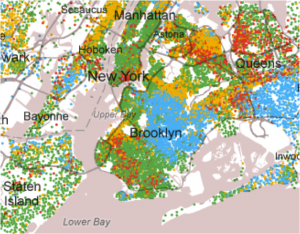Have I been waiting for this to happen…I’ve been using the freely available desktop version of CmapTools for years, extolling the virtues of this classic concept mapping tool, and now the good folks at the Florida Institute of Human & Machine Cognition (IHMC) have unveiled Cmap Cloud.
Concept maps are graphical representations of knowledge – think brainstorming or mind mapping but a little more structured. They usually start with a focus question and run hierarchically, demonstrating the relationships between concepts. One of the great things about CmapTools is that when you connect two concepts together you are prompted to add a linking phrase to define the relationship. Rather than just typing [pie]–[cherry], you might specify [pie]-can be-[cherry]. It turns out that this is not the easiest thing to do. We can write reams of text on a topic but at the same time get rather stuck mapping it out. In this way, concept maps demonstrate our knowledge of a subject area and reveal misconceptions. When we add new information to maps, we build connections to what we already know and meaningful learning can occur. Concept maps can also be used in groups to reach a shared understanding of the tasks at hand, with the added bonus that concepts in CmapTools can have resources attached to them. If you haven’t yet taken the time to explore the software, I invite you to try today and get in touch with me if you have questions.
Back to the Cloud. The desktop version allows you to save concept maps on a public server and create a website for sharing – amazing – but with the advent of the Cmap Cloud, you can also save your maps there and edit them online. I have been using it for a couple of days now and it can be a little slow at times, but many of the features are there. The nice part is that you can make friends with other Cmappers and share folders to work on projects together.
IHMC also have a new CmapTools for iPad. It is free to download but there is an in-app purchase to be able to export maps and sync them with the Cmap Cloud. I’ll be spending some time with it so look for my review on our new mobile apps blog.
![]()



